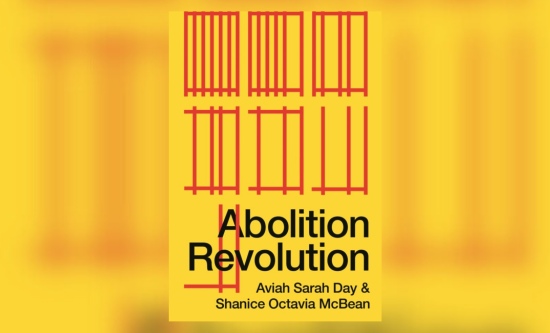
Abolition Revolution, Aviah Sarah Day and Shanice Octavia McBean, Pluto Press, 2022, £14.99
The 2020 police murder of George Floyd and growth of the subsequent massive Black Lives Matter movement internationally have led to much discussion around the questions of ‘defunding the police’ and ‘abolition’ of the machinery of imprisonment. We asked former long-term prisoner and FRFI contributor JOHN BOWDEN to review Abolition Revolution. JOHN writes:
Before the events of 2020, the politics of prison abolition had been totally marginalised and cast into a utopian wilderness. Abolition Revolution is an important contribution to re-establishing the discussion.
During the late 1960s and early 1970s prisoner support groups like Radical Alternatives to Prison (RAP) and Preservation of the Rights of Prisoners (PROP) represented a growing political awareness of the revolutionary significance of the struggle against prisons and an understanding of how prisons are essentially weapons of the capitalist state to keep the disobedient poor contained, and therefore must be abolished as part of a wider revolutionary struggle against capitalism.
During the 1980s the backlash of Thatcherite authoritarianism re-established the impregnability of prisons and even among the so-called radical left the dialogue regarding issues like prisoners’ rights became centred on acceptance of the inevitability of prisons in whatever form.
The murder of George Floyd reawakened an awareness of the true purpose of the police and other instruments of state repression like prisons, and how their abolition must be a vital part of the revolutionary struggle for socialism.
Abolition Revolution was published in 2022 and gives a powerful analysis of the true purpose of prisons and why the struggle against them must merge into a broader struggle against the capitalist system. The authors, Aviah Sarah Day and Shanice Octavia McBean, are members of Sisters Uncut – a group which began as a radical feminist campaign against cuts to domestic violence services and which gradually became abolitionist, as the impossibilities of reformism became apparent.
As well as describing the long history of colonial legacy embodied in modern police and prison systems, Abolition Revolution identifies the struggle to destroy prisons as an important part of the wider class struggle to overthrow and destroy capitalism. ‘Abolition is class struggle’ heads a chapter in the book and throughout the book their position that ‘Abolition cannot be anything other than a revolutionary, anti-capitalist struggle’ is expressed in a revolutionary communist way. Whilst the authors do not explicitly cite Marx, Engels or Lenin, other than via secondary sources, all of the underpinning of the book’s narrative, and the way it describes racism and imperialism, the use of a reserve army of labour, the role of women in the reproduction of labour for capitalism, and the way that police and prisons operate to protect capital, will be familiar to anyone who has ever looked at Engels on the family, private property and the state, or Lenin on State and Revolution.
Drawing on their own experiences in Sisters Uncut and the recent Kill the Bill demos and setting up of Copwatch groups, the authors also look back at some examples of where people in detention took direct action against the system oppressing them. Section 11 of the book therefore recounts the experiences of the men incarcerated in Strangeways in 1990 who took to the roof of the prison in a 25-day long protest against the brutality and neglect of the system, and the women in the Yarl’s Wood immigration prison in 2018, who staged a determined and high profile hunger strike to draw attention to their punitive detention and treatment. The section on the Strangeways uprising draws on Larkin Publications book Strangeways 1990: a serious disturbance, as well as protester Alan Lord’s autobiographical Life in Strangeways: from riot to redemption.
Day and McBean write that ‘The rebels at Strangeways and Yarl’s Wood may not have had explicitly abolitionist goals but they risked everything to take militant action in the hope of a dignified life’. They contrast this to activists who limit themselves to ‘academic theory, purity politics or ally-ship models’. Looking back at Strangeways they pose the question of unity in terms of the politics of the day: ‘We wonder what the revolutionary potential might have been, had the hundreds of thousands of poll tax rebels made their way to the prisons to combine the rage on the streets with that in the cells.’
Abolition Revolution centres the struggle against prisons firmly in the context of the struggle against the capitalist system itself: ‘Abolition must also be underpinned by an anti-capitalist, class analysis and practice. One that seeks to leverage class power in order to abolish the underlying conditions that give rise to a society that requires the control of the masses – the working and underclass – by the few in the ruling elite. This is the revolution in the abolition.’
The book emphasises how the abolition of prisons can only take place within the abolition of a social and economic system that marginalises and criminalises the most disadvantaged and oppressed: ‘A revolutionary and abolitionist vision cannot limit itself to dismantling. This is not the end goal of our liberation. Abolition must work towards the wider goal of seizing the land, natural resources and wealth stolen from us by capitalists; abolition must work in the service of proletarian revolution.’
The brutal police murders of Sarah Everard and George Floyd refuelled an atmosphere of discussion about abolition of the police, prisons and ‘criminal justice system’. Abolition Revolution is an excellent contribution to revitalising the possibility of building an anti-capitalist movement for abolition.




